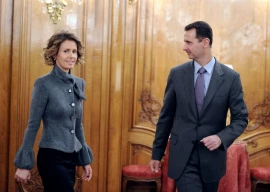
It is time to rethink the utility of nuclear deterrence in South Asia and a “minimisation strategy” might be a good place to begin anti-nuclear advocacy efforts.
This was stated by Gareth Evans, the former Australian Foreign Minister at a book launch and seminar organised by the Institute of Strategic Studies (ISS) on Thursday. Evans said nuclear weapons are practically “unusable,” both because of the damage they might inflict in combat and the international taboo surrounding their use.

“Nuclear weapons are not deterring conventional attacks so where does the utility really lie?” said Evans, who has served on several international commissions including the 2008-10 Commission on Nuclear Non-proliferation and Disarmament. “It is important in the South Asian context to rethink the extent to which security has really improved by possession of nuclear weapons.”
He said the way forward is to advocate a minimum nuclear deterrence level in nuclear policies. “Let’s get an agreement on no-first-use. Let’s get serious on curbing nuclear deployment,” Evans said. “It is very tough to go to zero (nuclear weapons) but if we can minimise the number of nuclear weapons, that would make the world a lot safer.”
Evans and Ramesh Thakur, director of the Centre for Nuclear Non-proliferation and Disarmament at Melbourne’s Australian National University, were invited by ISS to speak about modern diplomacy to mark the launch of The Oxford Handbook of Modern Diplomacy. The book was missing in action — participants were given forms to pre-order the book from the Oxford University Press instead — but the discussion turned to substantive issues as participants engaged the speakers to talk about nuclear non-proliferation and coercive diplomacy.
Responding to a question about military interventions on humanitarian grounds, Thakur, who has been closely associated with the United Nations (UN) in the past, said “Responsibility to Protect” (R2P), a 2005 UN initiative to prevent “mass atrocity crimes,” humanises diplomacy. Thakur said R2P’s victim-centric view, its focus on prevention and its redefinition of sovereignty not as a right but as a responsibility are some of the ways the initiative puts focus on protecting people in conflict zones.
Evans said the criteria set by the R2P framework for military intervention worked well in the case of Libya. But then, he said, France, United Kingdom and the US — three of the five permanent members of the UN Security Council — “contemptuously” took matters into their own hands and went beyond the protection of civilians to carry out a regime change in Libya.
Evans said a consensus on the R2P has to be recreated in the Security Council and the three permanent members who defied it have to take responsibility.
The two Australia-based experts sounded as only people who have worked long enough to understand intricacies of global diplomacy and the UN system would sound: honest about the system’s shortcomings, somewhat frustrated but defiant in the belief that the struggle to fix global problems must continue.
Earlier, Thakur said the nature of modern diplomacy has changed from the traditional representational diplomacy to include other forms such as shuttle diplomacy, celebrity diplomacy, multilateral efforts and “blue ribbon” commissions.
Evans said a commission could be considered successful if it contributes to building consensus by providing normative outcomes that achieve policy actions or clarify policy agenda. Clarity of objectives, sound leadership, effectiveness consultations, follow-up advocacy, ownership and timing are some of the 10 factors Evans said he thinks contribute to a commission’s success.
Published in The Express Tribune, October 25th, 2013.
COMMENTS (7)
Comments are moderated and generally will be posted if they are on-topic and not abusive.
For more information, please see our Comments FAQ
1734931835-0/Untitled-(81)1734931835-0-405x300.webp)






1734920182-0/Nigeria-(1)1734920182-0-270x192.webp)








1734778885-0/Untitled-(10)1734778885-0-270x192.webp)






After the advent of nuclear weapons the security environment has changed. There is no global war like WWI and WWII. No direct confrontation between the two super powers in cold war. Deterrence has become the corner stone of strategy. Nuclear deterrence is the core of strategic stability in South Asia
Of course bombs and missile are not solution of war. When it comes to nuclear deterrence, Nuclear weapons have played vital role in weakening Intensity of conventional wars. World have witnessed after Nagasaki and Hiroshima bombings. Yet we haven't seen any disastrous conventional war among the states. Nuclear Weapons have removed the conventional imbalances among the states. A state with more conventional superiority now is unable to attack on a state with small conventional capability if posses nuclear weapon. We have seen clearly in case of India and Pakistan. Its the nuclear capability which saved Pakistan from massive conventional retaliation by India.
@Ahsan Ali: do you think that those countries having nuclear armaments can really fire their nuclear weapons? Maybe but i do not think so that they can really do it as easy as firing an howitzer cannon or dropping 1000 lbs explosives into an area target. If Russia will release its nuclear weapon to CONUS and able to erase it from the map what will be its consequence to the whole world will it not be afflicted with nuclear fall-out including Russia? Do you think Russia and the whole world can have a safe place to live in? I believe no. If Pakistan will release its nuclear weapon against India and will deface it, do you think pakistan will bot be affected by the nuclear fall-out? Nuclear weapons and its possessor are just there as factual fact of reality threat but as to its practical use they are just there as a weapon of threat and power.
Not only theoretically but also practically it has been proved that nuclear deterrence doctrine has been failed to prevent wars. In fact the course of declared war or total war has been changed to Proxy wars and limited wars. Nuclear proliferation by powerful states has diminished the idea of nuclear zero and now the threat has been transformed into first use or as a last resort to counter offensive attack.
Rivalry between Pakistan and India is in the roots of the people of both countries which cannot be brushed off over the night. Both countries have fought thress wars, go through conflicts and skirmishes but introduction of nuclear weapons on both sides gave the deterrence purpose and created a balance of terror among both states. Pakistan and India didnt go to full fledge war after the introduction of nuclear weapons in the region which means nuclear weapons are serving their interest in the best possible way which is to provide deterrence capability to the states. Nuclear weapons also gave the assurances of peace and stability in the region.
It is written in the history that India-Pak has fought wars since their inceptions. Less than half of a century, a series of wars, violent conflicts and border skirmishes have been witnessed among the geographical neighbours. After the 1998, there are still certain intense situations which can likely triggered to full scale major wars like Kargil conflict, Nuclear stand-off but these highlight intense situations do not constitute the war. The reason is majorly the presence of nuclear weapons. It is the nuclear weapons which prevent the war otherwise there are strong likelihood of an aggressive and volatile moves. Outside south Asia, the chemistry of the presence of nuclear weapons is different than in south Asia. It is an admitted fact that besides having a fear of nuclear exchange in tense situations, nuclear weapons are been used for deterrence purposes primarily.
There is no doubt that South Asian peace and stability completely rests on nuclear deterrence and the ‘balance of terror’ that exists between nuclear-armed Pakistan and India. It was India who actually upset the balance of power and started the nuclear game in the region. These circumstances, however, prodded Pakistan to test nuclear weapons for deterrence and as an act to balance power. No country can overlook its security concerns and issues, and hence, Pakistan’s nuclear weapons serve as the guarantors of peace in the region. There is no historical evidence that nuclear weapons have made us “not truly safe.” And there is reason to believe that, paradoxically, these dangerous weapons have contributed to safety and security and still do. To be clear, until India has a responsive nuclear infrastructure—one capable of responding to any future challenges to the Pakistan's strategic interests—no arms-control treaty is likely even to get a vote between both the arch rivals.